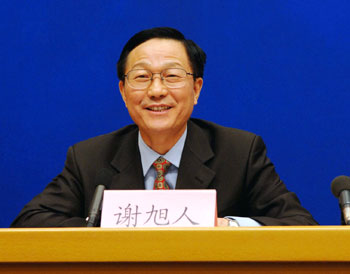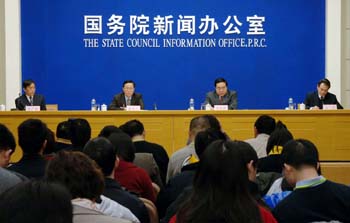| |
|

Xie Xuren, director of the State Administration of Taxation, gives a press conference sponsored by the State Council Information Office, Beijing, Jan.17,2006.[Xinhua Photo]
|
|

Xie Xuren, director of the State Administration of Taxation, gives a press conference sponsored by the State Council Information Office, Beijing, Jan.17,2006. [Xinhua Photo]
|
|

Xie Xuren (L, 2nd), director of the State Administration of Taxation, gives a press conference sponsored by the State Council Information Office, Beijing, Jan.17,2006. [Xinhua Photo]
|
At the press conference sponsored by the State Council Information Office on January 17, 2006, Xie Xuren, commissioner of State Administration of Taxation, briefed the press on the taxation work in 2005 and working plans for 2006. He also answered questions from the press.
Full text:
Review of Taxation Work in 2005 and Plans for 2006
State Administration of Taxation
January 17, 2006
In 2005, China's total tax revenue topped 3.0866 trillion yuan (excluding tariffs and agricultural taxes), up 20 percent and 514.8 billion yuan over 2004 and exceeding 3 trillion yuan for the first time. During the 10th five-year plan period, the total tax revenue remitted into the state coffer amounts to 10.9217 trillion yuan, with an average annual increase of 19.5 percent; and the revenue in the fifth year more than doubles that in the first year. The fast and steady growth of the tax revenue in pace with the economic growth has greatly enhanced the country's financial strength and provided solid financial guarantee for the country's efforts to build a well-off society in an all-round way.
The taxation work in 2005 bears the following three features:
Firstly, tax revenue growth is basically in line with the pace of economic growth, as can be reflected by the comparative analyses of major tax revenue contributors including domestic VAT, business tax, enterprise income tax, import taxes collected by the Customs on behalf and their corresponding economic indicators.
Secondly, the major contributors to revenue growth are turnover taxes and income taxes. Revenue growth from turnover taxes including the domestic VAT, exercise tax and business tax accounts for 49.5 percent of the total revenue growth, about the same level of 2004. Revenue growth from domestic and foreign enterprises income taxes and individual income tax accounts for 34.8 percent of the total revenue growth, 9.2 percentage points more than that in 2004.
Thirdly, revenues for the eastern, central and western regions increase by 19.2 percent, 22.4 percent and 21.7 percent respectively, with the growth rates for the central region and the western region being 3.2 and 2.5 percentage points higher than that for the eastern region respectively.
The fast growth in tax revenue for 2005 is a reflection of the steady and speedy growth of the national economy in 2005. It's also attributable to the support of various levels of governments and CPC committees and various sectors of the society as a whole. Another contributing factor is the efforts of tax administrations across the country to move taxation work under the rule of law and strengthen tax administration work. Last but not least, faithful taxpayers have contributed their bit by honestly complying with their tax liability.
In addition to steady and speedy tax revenue growth, 2005 also witnesses notable progress in the following aspects of the taxation work:
Taxation work has been brought further under the rule of law. Tax Administration Law and its Implementation Rules have been implemented, the revenue mobilization principles of "taxation by legislation, collecting all due taxes in full and no taxes ahead of the due time, and allowing no unauthorized granting of tax reduction and exemption" were strictly maintained.
Tax reforms have been deepened. The agricultural fees and taxes reform has resulted in the exemption of agricultural tax in 28 provinces and provincial-level regions and municipalities so far, and will bring about the complete abolishment of the Agricultural Taxes Rules beginning from January 1, 2006 as decided by the standing committee of the National People’s Congress. The export refund system has been further improved. Export refund and adjustment brought by exemption and credits amounts to 337.2 billion yuan, bringing the total amount for the 10th five-year plan period to 1.1941 trillion yuan. The pilot VAT reform was conducted in some industries in the northeast, and by the end of 2005, VAT input credit given out amounted to over 4 billion yuan. Individual Income Tax Law and its Implementation Rules have been revised.
Tax policies have been effectively implemented. The central government's macro control arrangements have been followed. Regulation on real estate transactions has been strengthened. Export refund policy for some highly energy-consuming, highly polluting and resources-based products has been adjusted. Resource tax rates for coal, crude oil and natural gas have been raised. Tax preferential policies to boost reemployment have been produced good results, benefiting millions of people across the country.
Tax administration work has been further brought up to standard. Source monitoring has been strengthened, administration of various tax types has been strengthened, taxpayers service has been improved, construction of the tax administration information system, e.g. Golden Tax Project has been accelerated. As a result, tax administration work has been improved both in quality and in efficiency.
Tax staff capacity building has been further enhanced, and the good public image of tax departments has been consolidated.
The 11th five-year plan period is a critical period for China's social and economic development. The 5th plenary session of the 16th party congress has set out the guiding principles, objectives, major tasks and policy measures for the period, and has also clearly shown the direction for the next stage of taxation work and reforms. All levels of tax administrations shall guide the overall taxation work with the scientific views of development, and implement these scientific views in the whole process and various aspects of the taxation work.
To be specific, we will:
Give full play to the role of taxation in serving the overall economic and social development, raising fiscal revenue for the country and adjusting economy and distribution. Contribute further to transforming the economic development modes, raising conditions in rural areas up to the standard of a socialist society, promoting balanced development between regions, building a resource-conserving and environment-friendly society.
Improve taxation work through further bringing taxation work under the rule of law, deepening tax reforms, strengthening scientific management and staff capacity building. Continue to do good work in management fundamentals and grassroots construction so as to set a solid foundation for administration at the higher level.
Further promote the honest and pioneering working style, and encourage staff to speak truth, do concrete work, pursue actual effects, work creatively and constantly strive for new progress.
2006 is the first year of the 11th five-year plan period, which places premium on bringing taxation work to a higher level. In 2006, all levels of tax administrations shall follow the guide of the Deng Xiaoping theory and "three represents," take scientific views of development to taxation work, observe the principles set by the 16th party congress and its 5th plenary session and the central economic work conference, hold to the mission of collecting revenue for the country and enforcing the law for the people, further bring the taxation work under the rule of law, push the tax reform steadily ahead, strengthen scientific management across-the-board, build a even stronger tax working force, ensure a steady increase in tax revenue, give full play to the role of taxation as a tool of regulating economy and distribution, contribute our bit to the country’s economic and social development.
Under this guideline, tax administrations across the country shall make efforts in the following aspects:
Firstly, further bring taxation work under the rule of law; strengthen tax law enforcement and its supervision. Implement the State Council’s program to promote good governance under the rule of law, strengthen tax legislation, standardize tax laws enforcement and intensify supervision on their enforcement, standardize the order of taxation work, strengthen tax law publicity campaign.
Secondly, take proactive yet steady efforts to promote reforms and improvements in the tax system, tax administration system and internal management system including the personnel system and work assignment system.
Thirdly, promote scientific and refined management with an aim to further enhancing the quality and efficiency of tax administration work. Improve tax analyses forecasting and tax evaluation, implement the tax controllers system, strengthen administration of VAT, enterprise income tax and individual income tax, improve taxpayers service.
Fourthly, standardize internal administration, do good work in financial management and government procurement, appropriately deal with complaints through letters or visits, improve working style and increase efficiency.
Fifthly, implement the third phase of the Golden Tax Project and strengthen the construction of the information system and the information applications system.
Sixthly, further improve tax staff's quality, inner cohesiveness and capacity to fulfill their missions. Strengthen capacity building for top management teams, intensify training for tax staff, continue the work to maintain the advanced nature of CPC members, strengthen efforts to foster the ethics of dedication, fairness, honesty and cleanness among CPC members.
|
|





